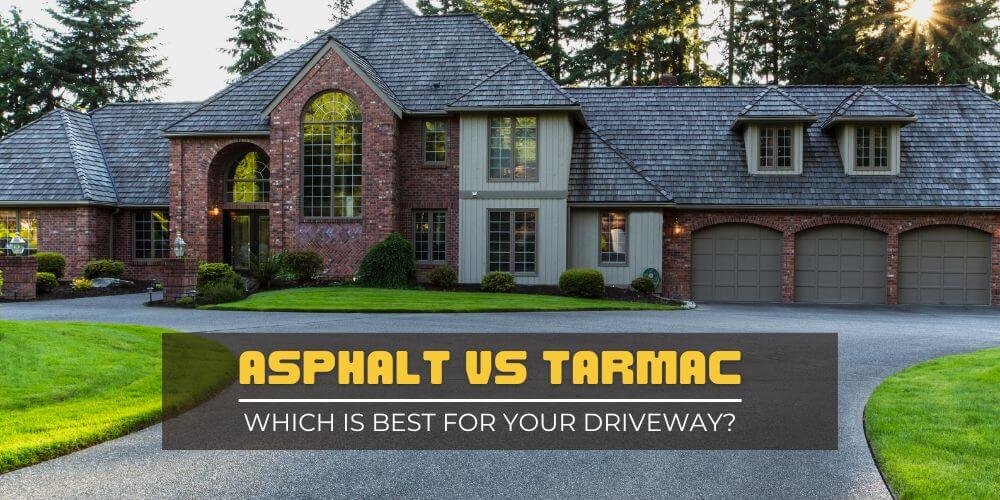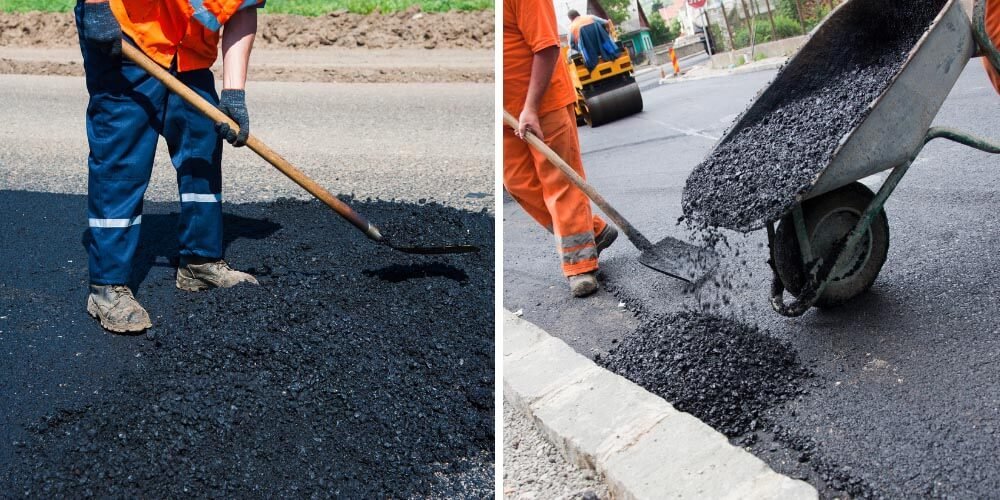Tarmac Vs Asphalt:- Which is best for your driveway?

Tarmac and asphalt look almost the same and are fabricated from similar materials, yet, asphalt and tarmac driveways bear their distinctive traits. Read on to find out more about these two highly popular driveway pavements.
What is Tarmac Driveway?
Tarmac is paved material, called tarmacadam, which consists of sand, tar, and gravel. The sand and stone are mixed with tar and then applied to the area prepared for the driveway. Once the tarmac is laid out, it is compacted by a vibrating roller that leaves a smooth, even surface.
Tarmac Driveway – Pros and Cons
The tarmac driveway has pros and cons has its own, just like any other pavement material:-.
Pros
- Quick Installation:- Tarmac driveways are known for their quick installation because they take a short amount of time, though this depends on the size of the driveway.
- Durability:- The Tarmac driveway is durable and lasts a long time. Well-paved tarmac driveway can last up to 20 years and stand up to extreme heat and cold.
- Cost-Effective:- Tarmac driveways offer incredible value for money, in both the short and the long term, which is an ideal option for those concerned about budgets and looking for an affordable solution.
Cons
- UV Light:- Regarding disadvantages, tarmac driveways are vulnerable to UV light exposure which causes the material to break down slowly over time. This results in cracks and potholes.
- Automotive Oil:- Petrol and diesel oil weaken the chemical bonds of tarmac which contribute to cracking. Moreover, you would have to watch out for fluid leakage from your vehicle.
- Unwanted Weeds:- Weeds can harm your tarmac driveway and damage the surface because they absorb water and allow the expansion of cracks.Plus, you must make sure that weeds do not sprout through the driveway if cracks are left unrepaired.
How long will Tarmac Driveway last?
As mentioned, with the proper cleaning and maintenance, a tarmac driveway can last for up to 2 decades. You can also boost the life of your driveway by repairing cracks as soon as possible.
What is Asphalt Driveway?
Asphalt is a paving material consisting of sand, stone, and a slurry-like substance derived from petroleum that is similar to tar in texture and thickness. This paving material liquefies at 149 degrees Celsius. Once the contractors lay the asphalt, they must shape it quickly before it hardens.
Asphalt Driveway – Pros and Cons
Pros
- Flexibility:- Likewise, an asphalt driveway has its pros—one of which is flexibility. For one thing, an asphalt driveway can handle salt and ice without cracking, unlike other materials like concrete which can crack under such conditions.
- Cost-Effective:- Asphalt is known for its affordable price, which is another reason why some homeowners prefer it. Compared to brick or concrete, asphalt is a much more cost-effective material.
- Noise Reduction:- Asphalt provides a smooth surface on which to drive vehicles. They can reduce the amount of noise that your vehicle makes as well as the overall noise levels around your home.
Cons
- Requires Regular Maintenance:- The drawback of asphalt driveways is that they require regular maintenance, you have to regularly maintain your asphalt driveway by applying new layers of sealant every 1-3 years, depending on environmental factors that contribute to wear and tear, such as heavy rains, high winds, and so on.
- Hot In The Summer:- Asphalt material gets hot in the summer, which is one of its biggest disadvantages. Due to their tendency to absorb heat, which may not be ideal for warmer climates.
- Aesthetics And Design:- Its downside is the fact that it only comes in one design. Compared to other materials, asphalt has a lower aesthetic appeal because of its lack of customization options. You can’t get extremely creative with asphalt. Additionally, it has an unfinished edging which might not work with just any aesthetic.
How long will Asphalt Driveway last?
The asphalt driveway lifespan depends on a few factors including climate and maintenance. Also, the strength of its base, the drainage, and the soil underneath affect its longevity. With proper installation and care (particularly periodic sealing), this type of driveway can last 25 to 30 years.
Similarities between Asphalt and Tarmac

As you may have noticed, both paving materials involve a petroleum-based substance as part of their makeup. They also consist of aggregates and sand. Both have some degree of flexibility in design and their ability to stand up to heat and cold without cracking. Also, it can withstand the weight of heavy vehicles.
Also Read:- Top 7 Asphalt Paving Materials
Which is best for your driveway?
Considering that tarmac and asphalt are widely used for commercial and residential driveways and parking areas, both would suit the purpose of giving a smooth, long-lasting, safe space for parking your vehicle. Tarmac might be more suitable for smaller spaces since asphalt is cost-effective for longer driveways. However, a contractor who is an expert at paving can help you determine which material works best for your road. At Tarworks Construction, we offer over a decade of experience in tarring and asphalt surfacing. If you have questions about your next project, please contact us for accurate information and a plan that surpasses your expectations while meeting your budget.
FAQ
Q) Is asphalt cheaper than tarmac?
A) For small parking areas or other small surfaces, asphalt comes out with a higher price tag than tarmac. On the other hand, tarmac costs less than asphalt in relation to maintenance because it doesn’t require sealant or needs to be cleaned as often.
Q) Which is more environmentally friendly?
A) Asphalt wins out as being more eco-friendly because it breaks up more easily and can be recycled at the end of its lifespan.
Q) Is asphalt the same as tarmac?
A) They are quite different when you look at what each one is made of. Tarmac is derived from tar, whereas asphalt consists of bitumen and aggregates.
Q) What are the uses of tarmac and asphalt?
A) Both have multiple purposes from roads and driveways to pavements and recreational areas like tennis courts.
Recommended Posts

What is the Difference Between Tarmac and Asphalt?
September 23, 2023

How Long Does a Tarmac Driveway Last?
May 18, 2023

Everything You Need To Know About Tarmac Driveway
February 13, 2023
